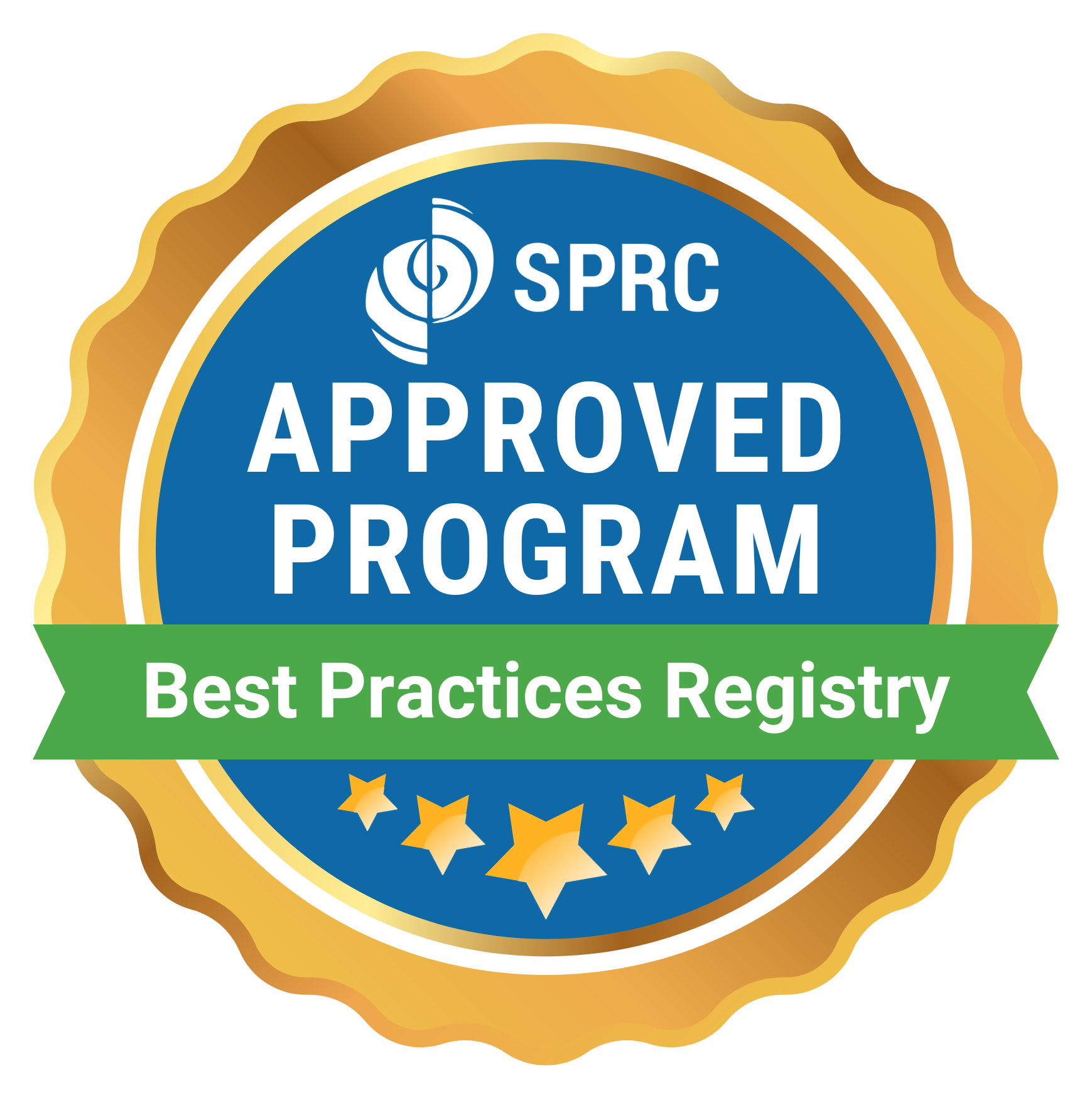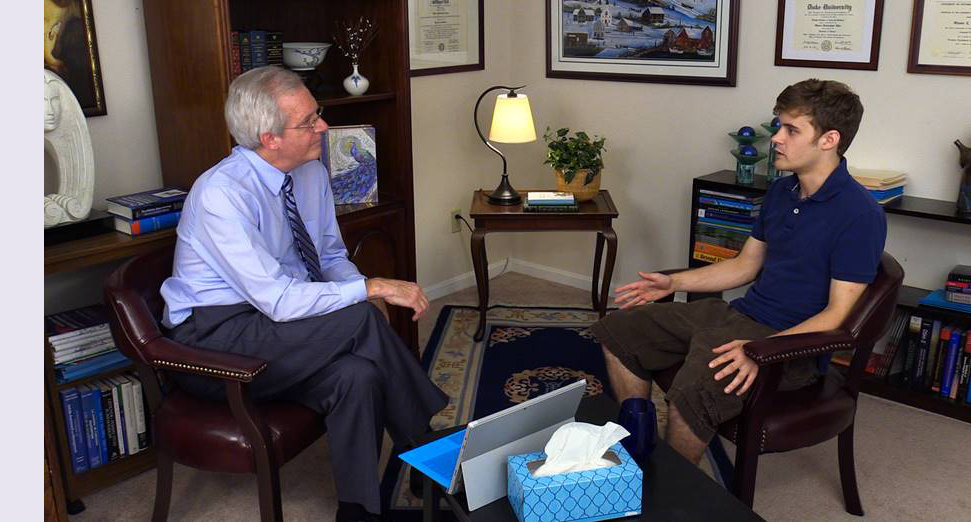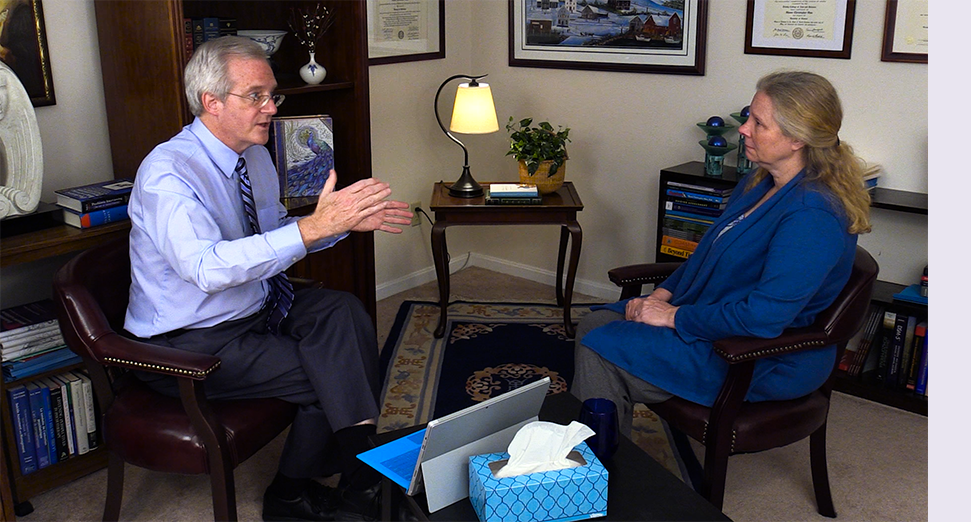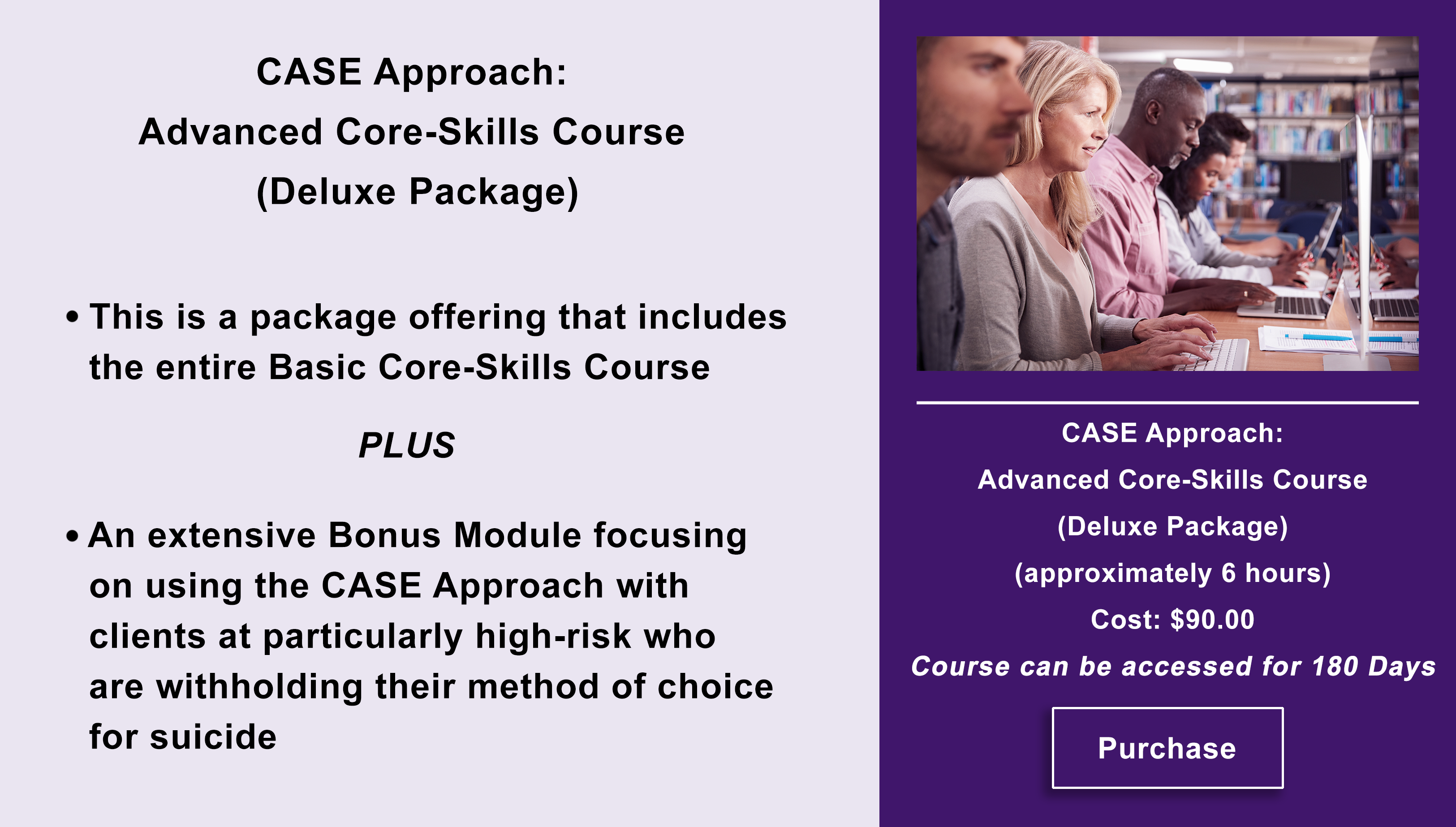 The CASE Approach - an evidence based intervention -
The CASE Approach - an evidence based intervention -
is listed on the federal Suicide Prevention Resource Center's "Best Practices Registry (BPR)" for recommended use across the United States
Description of the CASE Approach:
The CASE Approach is an easily learned interviewing strategy for uncovering suicidal ideation, planning, behaviors and intent. When using the CASE Approach, clinicians flexibly interweave innovative techniques from the field of clinical interviewing - known as Validity Techniques-  to decrease errors of omission, increase the client’s sense of safety when sharing suicidal thought, and to increase the validity of their self-reporting. These attributes allow the clinician to flexibly adapt their interviewing style to meet the unique needs of each client while sensitively uncovering a client’s potentially hidden method of choice for suicide (MOC), extent of actions taken using their MOC, and immediate intentions to use the MOC to proceed with suicide in clients at immediate risk (next 24 hours) or imminent risk (next 7 days).
to decrease errors of omission, increase the client’s sense of safety when sharing suicidal thought, and to increase the validity of their self-reporting. These attributes allow the clinician to flexibly adapt their interviewing style to meet the unique needs of each client while sensitively uncovering a client’s potentially hidden method of choice for suicide (MOC), extent of actions taken using their MOC, and immediate intentions to use the MOC to proceed with suicide in clients at immediate risk (next 24 hours) or imminent risk (next 7 days).
Unlike semi-structured formats clinicians never use cue sheets – or record information – while asking the questions used in the CASE Approach. This focused sensitivity upon the client allo ws clinicians to provide 100% of their attention to engaging the client and looking for nonverbal indicators of withheld secrets - secrets that can sometimes prove to be of life-saving importance. Both the evidence-based CASE Approach and the CASE Approach Online Courses are listed on the federal Suicide Prevention Resource Center’s Best Practices Registry (BPR) for recommended use across the Unites States.
ws clinicians to provide 100% of their attention to engaging the client and looking for nonverbal indicators of withheld secrets - secrets that can sometimes prove to be of life-saving importance. Both the evidence-based CASE Approach and the CASE Approach Online Courses are listed on the federal Suicide Prevention Resource Center’s Best Practices Registry (BPR) for recommended use across the Unites States.
Typical Course Video Sample
The highlight of this Advanced Skills Deluxe Package is the addition of an extensive module on utilizing the CASE Approach with particularly high-risk clients. This module provides some of the best illustrations of Dr. Shea interviewing ever captured on video. It provides the student with an insider’s look at the unique capabilities of the CASE Approach to help clients to share initially withheld, critically important suicidal ideation, planning, and intent.
In addition, in this Advanced Deluxe Package (which includes all of Course #1 as part of the package), the annotated answers at the end of each of the nine modules of the Core-Skills course are greatly expanded being designed to more powerfully consolidate the student’s ability to immediately transfer the sophisticated techniques of the CASE Approach into their frontline clinical care.
In addition, the expanded answers - found only in this Advanced Deluxe Package - delineate new material not thoroughly discussed in the stand-alone Core-Skills Course (Course #1). They engagingly delineate how the clinicians can use the CASE Approach to effectively uncover information useful in utilizing valuable emerging suicide assessment concepts such as ‘acquired capability’, ‘desensitization’, ‘entrapment’, and in exploring high-risk psychological states such as the ‘Acute Suicidal Affective Disturbance’ and the ‘Suicide Crisis Syndrome’.
As with Course #1, in this Advanced Skills Deluxe Package, Dr. Shea first introduces each innovative interviewing technique and strategy of the CASE Approach via text (to maximize and rapidly consolidate initial learning) that is penned with the same informal, fast-paced, and highly enjoyable writing style so popular in Dr. Shea’s seven books. Throughout the course, a variety of compelling video approaches are utilized including video didactics provided by Dr. Shea, realistic unscripted video demonstrations of Dr. Shea clinically using the CASE Approach, and video annotations by Dr. Shea providing insights into what just happened in the interview demonstrations.
What exactly is the voice-over option and why is it so popular?

Designed to meet the needs of any mental health professional (or primary care provider) who wants to learn how to do the CASE Approach at their highest level of proficiency - whether the clinician is totally unfamiliar with the CASE Approach or very familiar with it.
For participants who are new to the CASE Approach, the package includes the entire introductory CASE Approach: Core Skills Course from which the additional advanced material then logically springs.
For participants already familiar with the CASE Approach, this package (which includes the entire Core-Skills Course with extensive expansions of all of its annotated answers) serves as an outstanding avenue for consolidating and deepening the participants understanding of how to effectively use the CASE Approach. The participant's clinical skills are then taken to an even higher level of expertise provided by the addition of the completely new Bonus Module and videos on interviewing clients at particularly high risk.
Please note that this course does not provide CEs or CMEs.
Students do receive a certificate of completion from TISA
indicating a course completion time of 6 hours.
FAQs
-
Can the CASE Approach be used in teletherapy?
Absolutely. It is perfectly designed for teletherapy, meeting a great need in the aftermath of the COVID-19 pandemic. Indeed, it is also very effective for telephone interventions as is often seen with suicide prevention crisis lines.
-
Our organization is implementing a Zero Suicide Approach. Will training in the CASE Approach meet our needs?
The CASE Approach resonates nicely with the Zero Suicide Initiative as reflected by various trainings on the CASE Approach - provided by Dr. Shea - having been listed on the Zero Suicide’s Care Training Options List for years.
-
Does this course provide CEs or CMEs?
As noted above, this course does not provide CEs or CMEs. Students do receive a certificate of completion from TISA indicating a course completion time of 6 hours.
-
For what age groups is the CASE Approach designed?
The CASE Approach is specifically designed for use with adolescents and adults of all ages. It is not designed nor recommended for use with children.
On the other hand, the validity techniques utilized in the CASE Approach (as are well-described in both courses) are excellent for use with the parents of children to uncover secrets such as child abuse and neglect, problematic alcohol and/or substance use, or other parental behaviors that can damage children or thwart therapy.
-
In what clinical settings is the CASE Approach of use?
The CASE Approach is used in essentially all clinical settings including community mental health centers, inpatient units, university counseling centers, high schools, private practices, correctional facilities, military bases and VAs, Native American counseling centers, emergency departments, telephone crisis centers, and primary care clinics and general hospitals.
-
Can the CASE Approach be used in differing cultures and populations?
The CASE Approach has been used across numerous cultures, ethnic groups, races, and sexes including populations - such as the LGBTQI community - that cross all ethnicities and races.
If you are in crisis, you can find help at the
Lifeline Chat Room 988lifeline.org or call or text 988.



